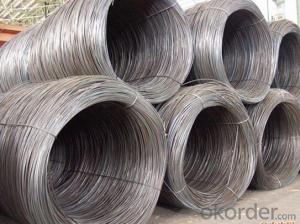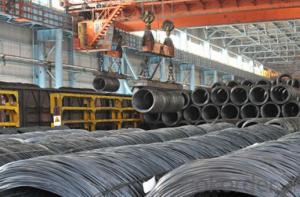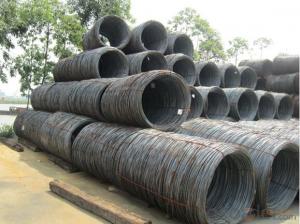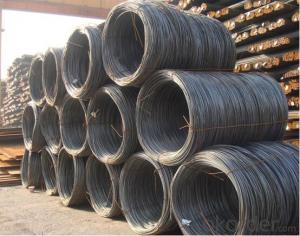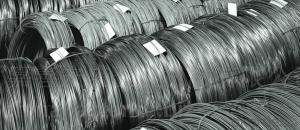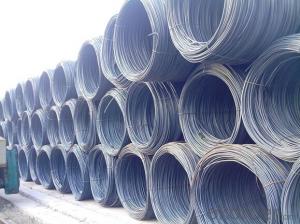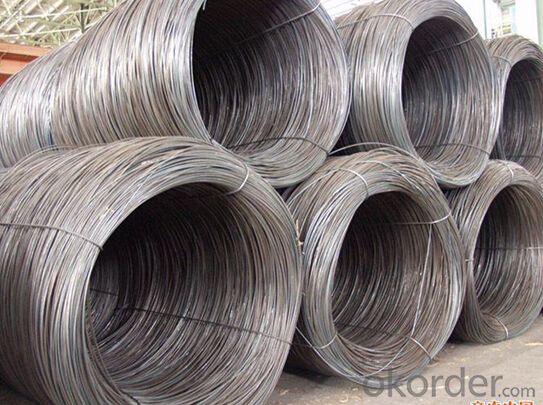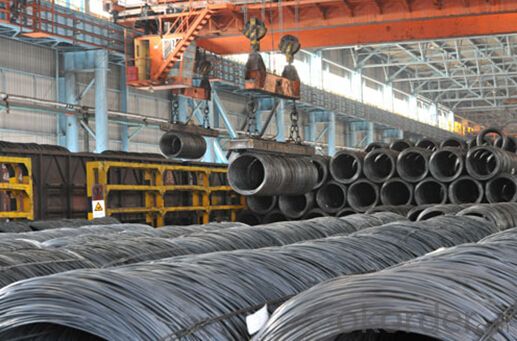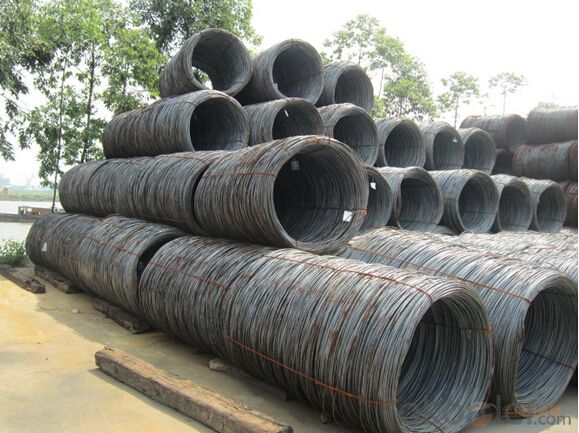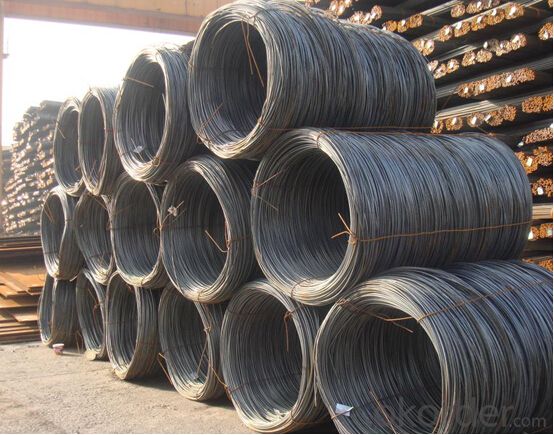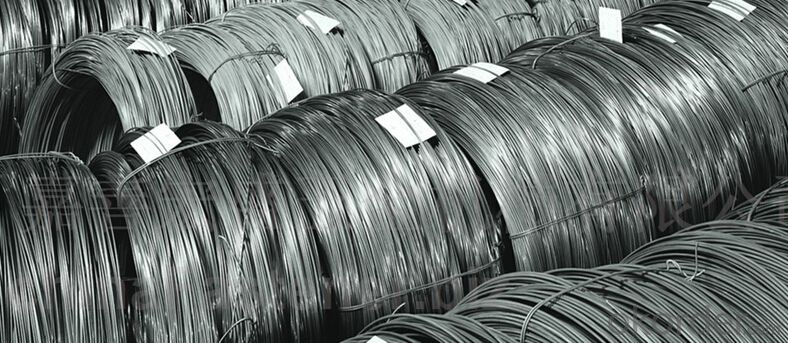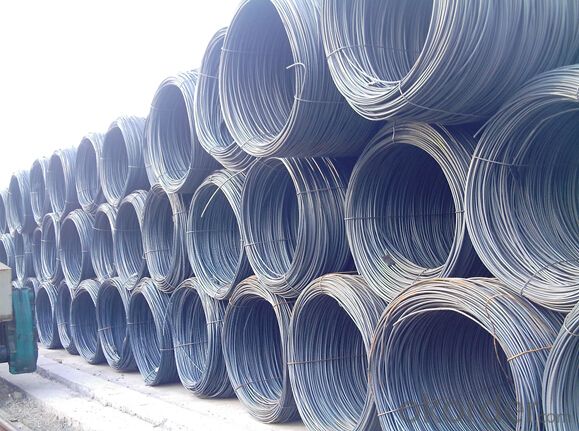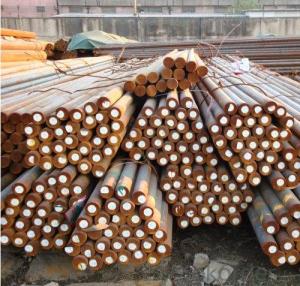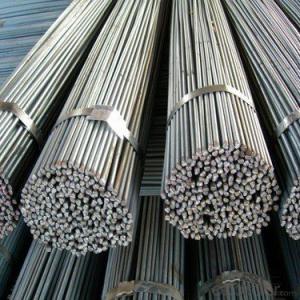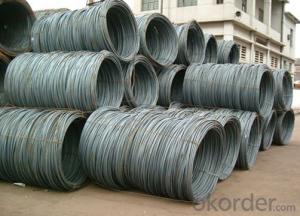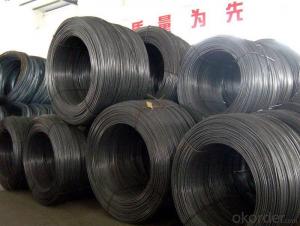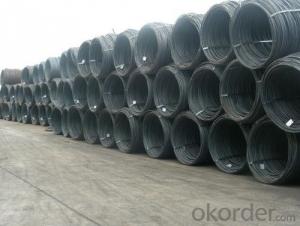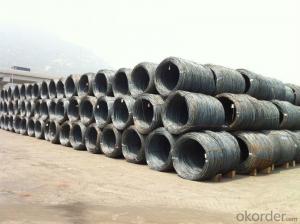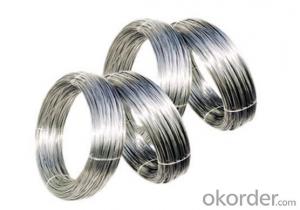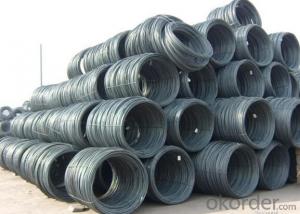Hot Rolled Structural SAE1008B 5.5mm Wire Rod
- Loading Port:
- Tianjin
- Payment Terms:
- TT OR LC
- Min Order Qty:
- 10 m.t.
- Supply Capability:
- 10000 m.t./month
OKorder Service Pledge
OKorder Financial Service
You Might Also Like
Specification
Hot Rolled Structural SAE1008B 5.5mm Wire Rod
Details of the Hot Rolled Structural SAE1008B 5.5mm Wire Rod
| Steel Grade | Q195-Q235,Q235,SAE 1008-1018 Hot Rolled Steel Wire Rod |
| Diameter | 5.5, 6.5, 7,8, 9,10, 12,14mm.etc. |
| Coil weight | 2m.t. |
| Application | drawing, construction materials, machinery parts,construction for Houses, Bridges, Roads,Packing |
| Deliver Time | 25-30 days after receipt of L/C or deposit by T/T |
| Packing | In coils, loading in container or by bulk vessel |
| Payment terms | 1).100% irrevocable L/C at sight. |
| 2).30% T/T prepaid and the balance against the copy of B/L. | |
| 3).30% T/T prepaid and the balance against L/C |
| Chemical Composition(%) | ||||||
| C | Mn | Si | S | P | Cr | |
| SAE1006B | 0.03~O.07 | ≤0.32 | ≤0.30 | ≤0.045 | ≤0.040 | 0.3-0.35 |
| Mechanical properties | ||||||
| Yield strength(N/mm2) | Tensile strength(N/mm2) | Elongation(%) | ||||
| 250-280 | 350-380 | ≥32 | ||||
| Grade | Chemical Composition(%) | |||||
| C | Mn | Si | S | P | Cr | |
| SAE1008B | 0.10max | 0.3~O.50 | 0.15max | 0.050max | 0.040 max | 0.3-0.35 |
| Mechanical properties | ||||||
| Yield strength(N/mm2) | Tensile strength(N/mm2) | Elongation(%) | ||||
| ≥195 | 315-430 | ≥30 | ||||
Supplier of the Hot Rolled Structural SAE1008B 5.5mm Wire Rod
CNBM International Corporation is the most import and export platform of CNBM group(China National Building Material Group Corporation) ,which is a state-owned enterprise, ranked in 270th of Fortune Global 500 in 2015.
With its advantages, CNBM International are mainly concentrate on Cement, Glass, Iron and Steel, Ceramics industries and devotes herself for supplying high quality series of refractories as well as technical consultancies and logistics solution.
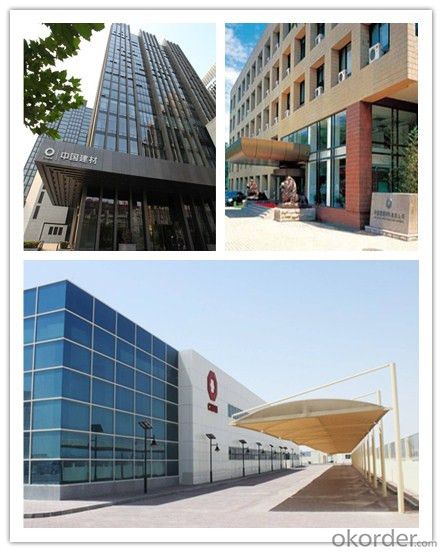
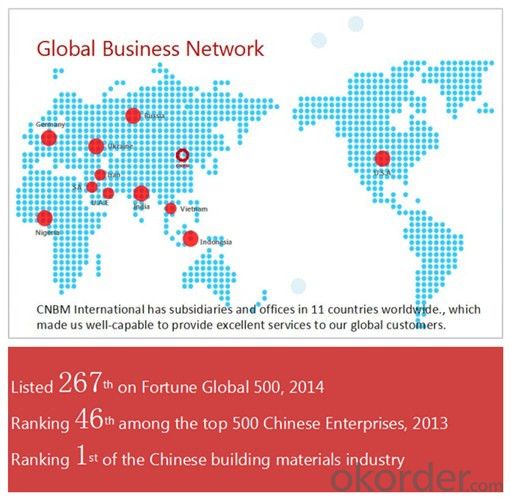
Delivery of the Hot Rolled Structural SAE1008B 5.5mm Wire Rod
Packaging Detail | Sea worthy packing /as per customer's packing instruction |
Delivery Detail | 15 ~ 40 days after receiving the deposit |
Products Show
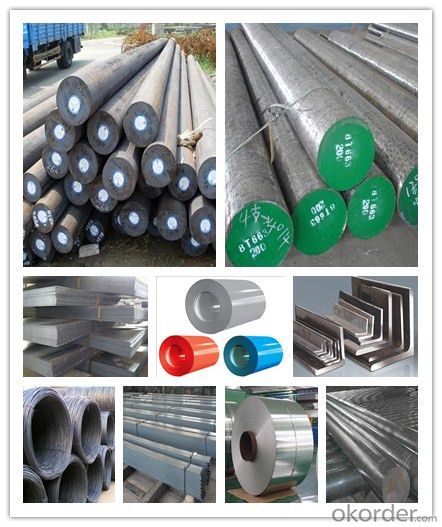
FAQ:
Are you a trading company or manufacturer? | Manufacturer |
What’s the MOQ? | 3 metric ton |
What’s your delivery time? | 15-35 days after downpayment received |
Do you Accept OEM service? | Yes |
what’s your delivery terms? | FOB/CFR/CIF |
What's the Payment Terms? | 30% as deposit,70% before shipment by T/T |
Western Union acceptable for small amount. | |
L/C acceptable for large amount. | |
Scrow ,Paybal,Alipay are also ok | |
Why choose us? | Chose happens because of quality, then price, We can give you both. Additionally, we can also offer professional products inquiry, products knowledge train (for agents), smooth goods delivery, excellent customer solution proposals. |
What's your available port of Shipment? | Main Port, China |
What’s your featured services? | Our service formula: good quality+ good price+ good service=customer's trust
|
Where are your Market? | Covering more than 160 countries in the world |
- Q: How does special steel contribute to the waste management industry?
- Special steel contributes to the waste management industry by providing durable and corrosion-resistant materials for the construction of waste handling equipment and infrastructure. Special steel is used to manufacture waste containers, compactors, shredders, and incinerators, ensuring their longevity and efficiency in handling waste. Additionally, special steel is utilized in the construction of waste treatment plants and landfill facilities, providing structural strength and resistance to harsh environmental conditions. Overall, special steel plays a crucial role in enhancing the effectiveness and sustainability of waste management practices.
- Q: Can special steel be used for manufacturing tools?
- Yes, special steel can definitely be used for manufacturing tools. Special steel refers to a specific type of steel that is carefully engineered and designed to possess certain properties and characteristics that make it suitable for specific applications. In the case of manufacturing tools, special steel is often preferred due to its exceptional strength, hardness, and durability. These properties enable tools made from special steel to withstand high levels of stress, wear, and impact, making them ideal for demanding applications such as cutting, drilling, shaping, and machining. Additionally, special steel can also exhibit excellent heat resistance, corrosion resistance, and dimensional stability, further enhancing its suitability for tool manufacturing. Overall, the use of special steel in tool production ensures the creation of high-quality, long-lasting, and efficient tools that can effectively perform various tasks in different industries.
- Q: What are the standards and certifications for special steel?
- Some of the standards and certifications for special steel include ISO 9001 for quality management systems, ISO 14001 for environmental management systems, and ISO 45001 for occupational health and safety management systems. Additionally, there are various industry-specific standards such as ASTM International, EN standards, and JIS standards that provide specifications and testing requirements for different types of special steel. These standards and certifications ensure that the special steel meets specific quality, safety, and environmental standards, and helps to establish trust and credibility in the industry.
- Q: Can special steel be used in the medical device manufacturing industry?
- Yes, special steel can be used in the medical device manufacturing industry. Special steel alloys, such as stainless steel, are commonly used in the production of medical devices due to their excellent corrosion resistance, biocompatibility, and mechanical properties. These materials provide durability, sterilization compatibility, and are suitable for various medical applications, including implants, surgical instruments, and diagnostic equipment.
- Q: What are the different heat treatment processes for special steel?
- There are several heat treatment processes for special steel, including annealing, quenching, tempering, and normalizing. Annealing involves heating the steel to a specific temperature and then slowly cooling it, which helps to enhance its ductility and reduce internal stresses. Quenching is a rapid cooling process that involves immersing the steel in a liquid, such as water or oil, to increase its hardness and strength. Tempering is a process that follows quenching, where the steel is heated to a lower temperature and then cooled, which helps to relieve internal stresses and improve toughness. Normalizing is a process similar to annealing, but the steel is air-cooled instead of being slowly cooled, resulting in a more refined grain structure and improved mechanical properties.
- Q: How does special steel contribute to the overall strength and durability of structures?
- Special steel contributes to the overall strength and durability of structures in several ways. Firstly, special steel is manufactured using specific alloying elements that enhance its mechanical properties, such as increased tensile strength and hardness. This makes it capable of withstanding higher loads and pressures, ensuring the structural integrity of the building or infrastructure. Moreover, special steel is known for its excellent corrosion resistance, which is crucial for structures exposed to harsh environmental conditions or in contact with corrosive substances. By preventing rust and degradation, special steel prolongs the lifespan of structures, reducing maintenance costs and the need for frequent repairs or replacements. Additionally, the unique properties of special steel allow for the creation of more streamlined and lightweight structures. Its high strength-to-weight ratio enables architects and engineers to design structures with thinner sections and reduced material usage without compromising strength. This not only saves costs but also minimizes the environmental impact associated with construction. Furthermore, special steel possesses exceptional toughness and impact resistance, making it highly resistant to fractures or buckling under extreme loads or dynamic forces. This property is particularly crucial for structures subjected to seismic events, heavy vibrations, or impacts, as it ensures the safety and stability of the building or infrastructure. In summary, special steel plays a vital role in enhancing the overall strength and durability of structures. Its unique mechanical properties, corrosion resistance, lightweight nature, and high toughness contribute to the longevity, safety, and cost-effectiveness of buildings and infrastructures.
- Q: Is special steel recyclable?
- Yes, special steel is recyclable.
- Q: What are the requirements for special steel used in power generation equipment manufacturing?
- The requirements for special steel used in power generation equipment manufacturing include high strength, excellent corrosion resistance, good thermal conductivity, and the ability to withstand high temperatures and pressures. Additionally, the steel should have low levels of impurities and be able to maintain its mechanical properties over an extended period of time.
- Q: Can special steel be used in the printing industry?
- Yes, special steel can be used in the printing industry. Special steel, such as stainless steel or tool steel, can be utilized in the manufacturing of printing equipment and machinery parts. These types of steel provide excellent strength, durability, and resistance to wear and corrosion, making them suitable for various components used in printing presses, rollers, blades, and other machinery.
- Q: Can special steel be used in the packaging industry?
- Yes, special steel can be used in the packaging industry. Special steel, such as stainless steel, offers excellent durability, corrosion resistance, and strength, making it suitable for various packaging applications. It can be used to manufacture packaging containers, machinery, and equipment, providing a reliable and long-lasting solution for packaging needs.
Send your message to us
Hot Rolled Structural SAE1008B 5.5mm Wire Rod
- Loading Port:
- Tianjin
- Payment Terms:
- TT OR LC
- Min Order Qty:
- 10 m.t.
- Supply Capability:
- 10000 m.t./month
OKorder Service Pledge
OKorder Financial Service
Similar products
Hot products
Hot Searches
Related keywords
